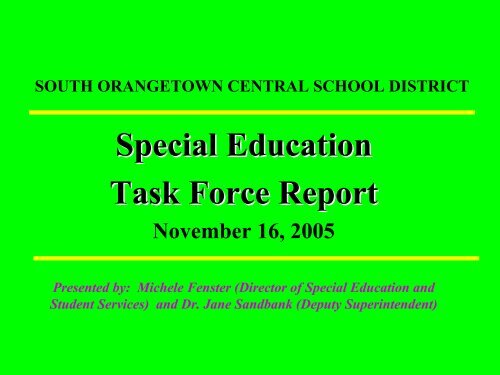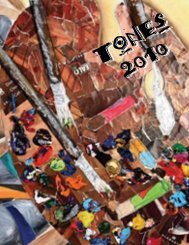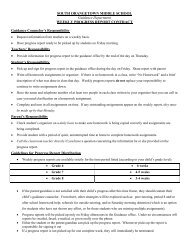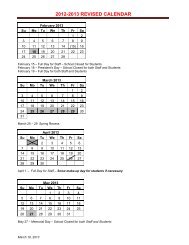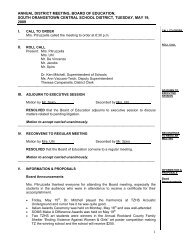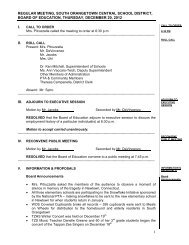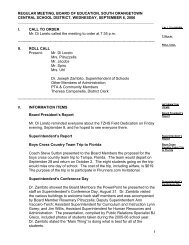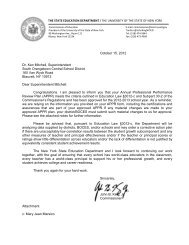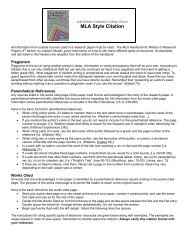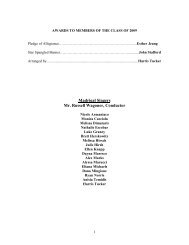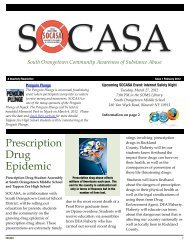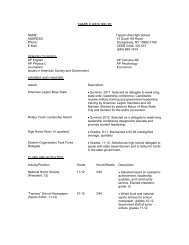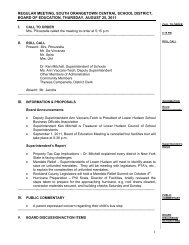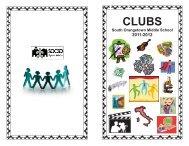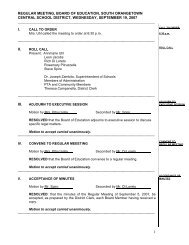Special Education Task Force Presentation, Nov - South ...
Special Education Task Force Presentation, Nov - South ...
Special Education Task Force Presentation, Nov - South ...
Create successful ePaper yourself
Turn your PDF publications into a flip-book with our unique Google optimized e-Paper software.
SOUTH ORANGETOWN CENTRAL SCHOOL DISTRICT<br />
<strong>Special</strong> <strong>Education</strong><br />
<strong>Task</strong> <strong>Force</strong> Report<br />
<strong>Nov</strong>ember 16, 2005<br />
Presented by: Michele Fenster (Director of <strong>Special</strong> <strong>Education</strong> and<br />
Student Services) and Dr. Jane Sandbank (Deputy Superintendent)
Who is the <strong>Special</strong> <strong>Education</strong><br />
<strong>Task</strong> <strong>Force</strong>?<br />
<strong>Special</strong> thank you . . .<br />
Debra Arouesty<br />
Trish Bakker<br />
Carol Baxter<br />
Mary Ceccolini<br />
Irene Cronin<br />
Fran Curcio<br />
Nancy Forman<br />
Jeanne Goldstein<br />
Ben Gutkin<br />
Pam Hess<br />
Peter Jelalian<br />
Michelle Jones<br />
Theresa Kovar<br />
Karen LaFiandra<br />
Mary McLaughlin<br />
Betty Ann O’Sullivan<br />
Jeanne Palumbo<br />
Heidi Spitzer<br />
Lynn Trager<br />
Ann Marie Uhl<br />
Kathy VonDollen
What did we review and report<br />
Essential Question:<br />
on?<br />
How well are we meeting the needs of our<br />
<strong>Special</strong> <strong>Education</strong> students so that they<br />
meet with success?
How did we conduct the study?<br />
• The <strong>Task</strong> <strong>Force</strong> met on an on-going basis<br />
from 2/8/05 to 9/28/05<br />
• Surveys to <strong>Special</strong> <strong>Education</strong> parents,<br />
and all teachers<br />
• Focus groups – <strong>Special</strong> <strong>Education</strong><br />
parents, all teachers, students, student<br />
alumni
What did we look at?<br />
• Review of SOCSD program and services<br />
• Review of reauthorization of IDEA<br />
• NYS guidelines and regulations<br />
• Student performance data<br />
• SOCSD three-year plan for <strong>Special</strong> <strong>Education</strong><br />
• Program evaluation model<br />
• Action research model<br />
• Current research review<br />
• Qualitative and quantitative data
Who receives services?<br />
Reported by NYS as of December 1, 2004:<br />
• 440 students<br />
– 370 in our schools<br />
– 64 in other public schools<br />
– 5 students in private schools<br />
– 1 home/hospital
What are the 13 <strong>Special</strong><br />
<strong>Education</strong> classifications?<br />
• Autism<br />
• Emotional Disturbance<br />
• Learning Disability<br />
• Mental Retardation<br />
• Deafness<br />
• Hearing Impairment<br />
• Speech or Language<br />
Impairment<br />
•Visual Impairment<br />
•Orthopedic Impairment<br />
•Other Health Impairment<br />
•Multiple Disabilities<br />
•Deaf Blindness<br />
•Traumatic Brain Injury
What does the SOCSD<br />
program look like?<br />
• Declassification Support Services – All grades<br />
• Related Services – All grades<br />
– Speech pathology<br />
– Audiology<br />
– Psychological services<br />
– Physical therapy<br />
– Occupational therapy<br />
– Counseling services<br />
– Parent counseling and training<br />
– School health services
Programs continued . . .<br />
• Consultant Teacher Services: minimum 2 hrs.<br />
weekly<br />
• Resource Room Services – TZHS<br />
– Pilot program at TZE<br />
• Support Skills Services – SOMS<br />
• Co-Teaching – All grades<br />
• Center-Based/<strong>Special</strong> Classes<br />
• <strong>Special</strong> Class Intensive Models - SOMS/TZHS
Programs continued . . .<br />
• COVE program - TZHS/SOMS<br />
• TSP (Therapeutic Support Program ) –<br />
SOMS<br />
• KEA (Keys for <strong>Education</strong>al<br />
Achievement) – SOMS<br />
• Home/Hospital Instruction
What does the<br />
assessment data<br />
show?
Math 4<br />
This chart compares<br />
SOCSD scores for<br />
students with disabilities<br />
to NYS scores for<br />
students with disabilities.<br />
(% of students who scored<br />
at the Proficient or<br />
Advanced level)<br />
80%<br />
70%<br />
60%<br />
50%<br />
40%<br />
30%<br />
20%<br />
10%<br />
0%<br />
2004<br />
2005<br />
76%<br />
69%<br />
49%<br />
55%<br />
SOCSD<br />
NYS
Math 8<br />
This chart compares<br />
SOCSD scores for<br />
students with disabilities<br />
to NYS scores for<br />
students with disabilities.<br />
(% of students who scored<br />
at the Proficient or<br />
Advanced level)<br />
80%<br />
70%<br />
60%<br />
50%<br />
40%<br />
30%<br />
20%<br />
10%<br />
0%<br />
2004<br />
2005<br />
59%<br />
30%<br />
21% 19%<br />
SOCSD<br />
NYS
ELA 4<br />
This chart compares<br />
SOCSD scores for<br />
students with disabilities<br />
to NYS scores for<br />
students with disabilities.<br />
(% of students who scored<br />
at the Proficient or<br />
Advanced level)<br />
80%<br />
70%<br />
60%<br />
50%<br />
40%<br />
30%<br />
20%<br />
10%<br />
0%<br />
2004<br />
2005<br />
41%<br />
38%<br />
28%<br />
23%<br />
SOCSD<br />
NYS
ELA 8<br />
This chart compares<br />
SOCSD scores for<br />
students with disabilities<br />
to NYS scores for<br />
students with disabilities.<br />
(% of students who scored<br />
at the Proficient or<br />
Advanced level)<br />
80%<br />
70%<br />
60%<br />
50%<br />
40%<br />
30%<br />
20%<br />
10%<br />
0%<br />
2004<br />
2005<br />
35%<br />
30%<br />
8%<br />
10%<br />
SOCSD<br />
NYS
Percentage of <strong>Special</strong><br />
<strong>Education</strong> students passing<br />
required Regents exams - 2005<br />
• English – 94%<br />
• Math A – 86%<br />
• World History – 75%<br />
• U.S. History – 77%<br />
• Living Environment – 90%<br />
• Earth Science – 76%
What did the class of 2005<br />
accomplish?<br />
• 96% proceeded to college!!<br />
• 27 students graduated
What did we learn from the<br />
<strong>Special</strong> <strong>Education</strong> study?
Overall Strengths<br />
• High percentage of Level 3 & 4 scores on<br />
New York State ELA/Math assessments<br />
at Grade 4, Grade 8, and Regents-level<br />
testing of students with disabilities<br />
• 74% of <strong>Special</strong> <strong>Education</strong> students<br />
earned Regents diplomas<br />
• 37% earned an advanced Regents<br />
diploma
Overall strengths continued . . .<br />
• 96% of <strong>Special</strong> <strong>Education</strong> graduates went on to<br />
college<br />
• 59% of those attended 4-year colleges<br />
• Co-teach model (specially noted in Tristate<br />
Report)<br />
• 92% of parents report high levels of<br />
satisfaction with integration of students into the<br />
culture of the class.<br />
• COVE program
Overall strengths continued . . .<br />
• 80% of parents were satisfied or highly<br />
satisfied with their children’s academic<br />
programs<br />
• High levels of satisfaction with teacher<br />
effectiveness<br />
• Improved communication between<br />
SOCSD and out-of-district placement
What are the areas needing<br />
improvement?<br />
• CSE process<br />
• IEP development<br />
• Consistency of services<br />
• Integration of <strong>Special</strong> <strong>Education</strong> students<br />
into larger school culture<br />
• More frequent reports to parents on<br />
student progress<br />
• More time for collaboration
Areas in need of improvement<br />
continued . . .<br />
• Increase focus on social/emotional<br />
growth especially at middle school level<br />
• Increased reading services<br />
• 504 process<br />
• Clarification of distinctions between 504<br />
and <strong>Special</strong> <strong>Education</strong> designations
What are the specific<br />
recommendations of the<br />
<strong>Special</strong> <strong>Education</strong> <strong>Task</strong><br />
<strong>Force</strong>?
Recommendations<br />
• Staffing<br />
– Middle and High School Learning Consultant<br />
– Full-time CSE Chairperson<br />
• Reading<br />
– Initiate a scientifically-based reading program<br />
(begun Summer 2005)
Recommendations continued . . .<br />
• CSE Communication/IEP Development<br />
– Develop a more standardized, better articulated K-12<br />
CSE process<br />
– Strengthen the partnership and focus among CSE<br />
members<br />
– Advance communication of information within and<br />
across buildings, levels, departments and parents<br />
– Ensure a collaborative process, where outcomes are not<br />
previously decided<br />
– Focus on effective use of time at CSE meeting to address<br />
issues<br />
– Offer increased training of a skill set for all members of<br />
a CSE including parents, in order to develop consensus<br />
building
Recommendations continued . . .<br />
• Communication<br />
– Increase parent communication through<br />
appropriate structures for workshops and<br />
information sharing, especially focused on the CSE<br />
process and IEP development<br />
– Develop a plan to improve communication between<br />
interdisciplinary team members<br />
• 504<br />
– Review 504 process with parents and building teams
Recommendations continued . . .<br />
• Professional Development<br />
– Continue to provide adequate time,<br />
experiences and structures for appropriate<br />
professional communication and to advance<br />
knowledge of best practice<br />
• Program<br />
– Review K-12 continuum of services to meet<br />
our student needs
ACTION PLAN<br />
• Present staffing needs as part of 2006 –<br />
2007 <strong>Special</strong> <strong>Education</strong> budget<br />
• Training in multi-sensory reading for K-<br />
12 staff<br />
• Establish structures, networks, meetings,<br />
workshops, opportunities and vehicles for<br />
on-going school, district and parent<br />
communication and problem solving
Action Plan continued . . .<br />
• Offer on-going system-wide training in<br />
CSE/IEP process<br />
• Continue evaluation of all programs and<br />
services<br />
• Review structures and communication<br />
vehicles that focus on 504 student issues<br />
• Increase professional development focus<br />
on social/emotional issues
Success


